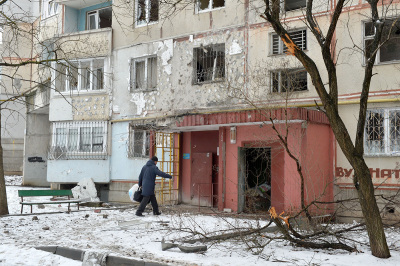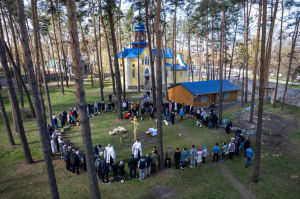Economic ramifications of Russia’s invasion of Ukraine

As the world recoils in dismay and disgust at Russian aggression and grieves for the horrific suffering of the Ukrainian people, many Americans are just beginning to grasp the economic ramifications of this violence.
After the devastation of two world wars in the first half of the 20th century, most of humanity has embraced peace. We have learned the priceless lesson that human welfare is advanced far more by the positive-sum practice of engaging with foreign populations in peaceful and mutually beneficial commerce rather than by the primitive zero-sum practice of war, which destroys valuable assets — property, yes, but especially human lives.
Perhaps the poster child for peace should be the French and Germans. In two world wars and in multiple skirmishes in the 19th century, generations of French and Germans fought each other. Today, having seen the light of reason, they share open borders, a common currency, and together are enjoying the blessings of peace and prosperity.
Unfortunately for the Ukrainians and the rest of the world, Vladimir Putin and his henchmen haven’t learned that lesson. I include “the rest of the world” because people around the globe are going to feel economic pain from the Russian invasion.
Today’s world is more interconnected than at any previous stage of history. A global division of labor has evolved over the past seven-plus decades that has resulted in specializations and efficiencies that have generated unprecedented wealth and raised standards of living for billions of human beings. The downside of such comprehensive economic interconnectedness is that war that appears to be between just two countries can cause disruptions in global networks of commerce and trade that cause chain reactions of economic disruption in many other countries.
Here is just a sampling of the global economic fallout to expect from the Russian assault on Ukraine:
Ukraine produces close to half of the world’s neon. (I have read 40%, 50%, and 70%. Whatever figure is closest to the truth, it’s a lot.) Today, neon isn’t used much in electric light signs as in the 1950s; rather, it is a crucial element used in the manufacturing of semiconductor chips. In 2021, we saw some shortages of automobiles due to not having access to enough computer chips. If the world suddenly loses half its neon supply, we’ll see supply chain breakdowns for cars and other modern devices that will dwarf what we have seen so far.
Food prices will rise, perhaps a lot. Between them, Russia and Ukraine account for approximately 30% of global wheat exports —12% of it coming from Ukraine, historically known as “the breadbasket of Europe.” With the whole country under siege, how much wheat will be planted in Ukraine this spring? Much less than normal, for sure. And who knows how the Russian wheat crop will be affected, especially as a result of sanctions. Prices of wheat (which have been trading “limit up” in the American futures markets on an almost daily basis) are soaring. Prices of other foodstuffs, too, will rise as demand that used to be satisfied by buying wheat will be diverted to demand for other grains. Pity the poor people of the world who will have a harder time affording the food they need.
Energy prices already have risen sharply and may continue to do so. Russia exports account for eight percent of the global supply. If sanctions and import bans prevent that oil from reaching global markets, who knows how high the price of oil will go? Russia is also a major producer of natural gas, so gas prices look set to rise much higher. And because natural gas is used in the manufacture of fertilizers, already-rising fertilizer prices could go much higher, which will put additional upward pressure on food prices.
The biggest economic threat coming out of the Russian invasion of Ukraine could be in the financial markets. Again, remember how interconnected the global economy has become. A few days ago, the price of nickel exploded 82% higher in just one day on the London Metal Exchange due to uncertainties about nickel supplies, since Russia is a major supplier of nickel. As a result, a unit of China Construction Bank Corp., one of the four largest Chinese banks, which had shorted nickel futures, received a margin call in the hundreds of millions of dollars from the LME. They were unable to pay it. Such a default could ripple through numerous counterparties (remember the tangled web of derivatives that started to unravel in the 2007-2008 financial crisis), and so LME granted them an extension.
As this is being written, there is no way of knowing how it will play out, but we need to recognize that the world’s financial system — overextended, as always, by using too much leverage — could start to implode as a result of defaults. Would the Federal Reserve and other central banks be able to stop such a panic? Could they do that without throwing additional fuel on the fires of inflation? Suffice it to say that the global financial system is in a precarious position.
We can only hope and pray that a peaceful resolution in Ukraine is found quickly, not just for the paramount humanitarian reason of sparing thousands if not millions of lives, but also to prevent immense collateral economic damage, including possibly a global economic crackup.
Originally published at The Institute for Faith & Freedom.
Dr. Mark W. Hendrickson is a retired adjunct faculty member, economist, and fellow for economic and social policy with the Institute for Faith and Freedom at Grove City College.



























